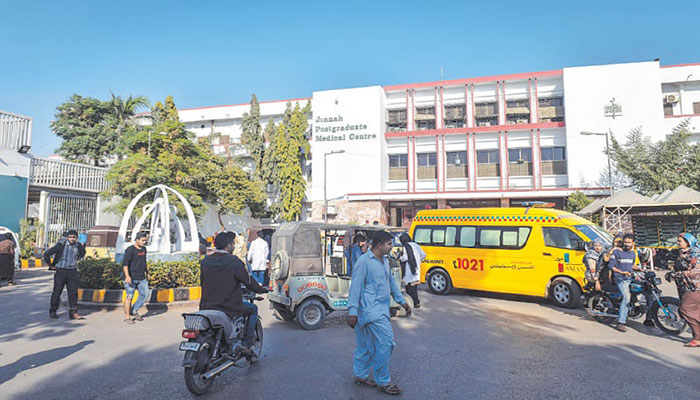SHC seeks progress on 2010 order to build prisoners ward at JPMC
The Sindh High Court (SHC) on Monday directed the executive director of the Jinnah Postgraduate Medical Centre (JPMC) to submit a compliance report detailing what steps have been taken to construct a separate ward to accommodate and secure under-trial and convicted prisoners sent to the hospital for treatment.
The direction of the court came on a petition with regard to the provision of medical treatment to the under-trial prisoners who were sent to hospitals for medical treatment.
The SHC’s division bench headed by Justice Mohammad Karim Khan Agha observed that on September 16, 2010, the court had issued orders to the executive director of the JPMC to construct a jail ward for prisoners so they could be treated there.
The court observed that the matter was pending since the last 10 years, and it is expected that such a jail ward for prisoners at the JPMC has already been built so they could be secured during medical treatment.
The bench directed JPMC Executive Director Seemin Jamali to appear before the court and file a compliance report by December 15 on the steps taken in the past decade to construct a separate ward to accommodate and secure under-trial and convicted prisoners sent to them for treatment.
An under-trial prisoner had filed a complaint to the SHC with regard to non-treatment at public hospitals. The prisoner said he was taken to prison with a firearm injury and referred to the JPMC for treatment, but he was sent back to jail with the advice to be treated inside the prison due to security concerns.
Missing children
The SHC directed an investigating officer to submit a detailed progress report with regard to the recovery of 14 children who had gone missing from different parts of Karachi.
The bench was informed that steps were being taken for the recovery of the missing children through modern techniques. The IO submitted that the police had managed to trace one more missing child, namely Manzoor Hussain, and produced him in court.
The court observed that 14 children were still missing, and directed the police to take all the measures to recover the children at the earliest.
The bench directed the police to continue their best efforts and trace more children before the next hearing, and submit further progress report on February 3.
The petitioner, namely the Roshni Helpline Trust, had moved the court asking it to issue directives to the police that missing children’s cases be considered as a cognisable offence and investigation be initiated without any delay.
The counsel for the petitioner had submitted that the whereabouts of 14 children were still untraceable, and requested the court to direct the police to recover them. The petitioner said the cases of missing children were not properly investigated, which resulted in many children losing their lives.
-
 Chloe Kim Set For Historic Halfpipe Gold Showdown At Milano Cortina
Chloe Kim Set For Historic Halfpipe Gold Showdown At Milano Cortina -
 Brooklyn Beckham Gives Cold Response To Cruz's Olive Branch Amid Feud
Brooklyn Beckham Gives Cold Response To Cruz's Olive Branch Amid Feud -
 Woman Arrested Months After Allegedly Staging Husband’s Murder As Suicide
Woman Arrested Months After Allegedly Staging Husband’s Murder As Suicide -
 Senior US Politician Makes Formal Accusation Against Andrew As Woman Under Him Is Sex Trafficked
Senior US Politician Makes Formal Accusation Against Andrew As Woman Under Him Is Sex Trafficked -
 X Product Head Warns AI Spam Can Make IMessage And Gmail Unusable
X Product Head Warns AI Spam Can Make IMessage And Gmail Unusable -
 Tyler Childers, Wife Senora May Expecting Second Baby
Tyler Childers, Wife Senora May Expecting Second Baby -
 ‘Smiling Electrons’ Discovered In Earth’s Magnetosphere In Rare Space Breakthrough
‘Smiling Electrons’ Discovered In Earth’s Magnetosphere In Rare Space Breakthrough -
 Cardi B Airs Chilling Threat To Authorities Over Arresting Her Fans
Cardi B Airs Chilling Threat To Authorities Over Arresting Her Fans -
 Bangladesh Sees High Turnout In Landmark National Election
Bangladesh Sees High Turnout In Landmark National Election -
 Lufthansa Cancels Hundreds Of Flights Amid Pilot And Cabin Crew Strike
Lufthansa Cancels Hundreds Of Flights Amid Pilot And Cabin Crew Strike -
 Video: Prince Harry Tears Up Talking Of His Court Case & Children: ‘Don’t Feel Shame Even If A Judge Makes Demands'
Video: Prince Harry Tears Up Talking Of His Court Case & Children: ‘Don’t Feel Shame Even If A Judge Makes Demands' -
 King Charles Issues New Statement For ‘carers’ Two Days After Promising To Support Police Action Against Andrew
King Charles Issues New Statement For ‘carers’ Two Days After Promising To Support Police Action Against Andrew -
 Gene Simmons Makes Major Claim Against Rock & Roll Hall Of Fame
Gene Simmons Makes Major Claim Against Rock & Roll Hall Of Fame -
 Vladyslav Heraskevych Disqualified From Winter Olympics 2026 Over Helmet Controversy
Vladyslav Heraskevych Disqualified From Winter Olympics 2026 Over Helmet Controversy -
 Late James Van Der Beek Inspires Bowel Cancer Awareness Post Death
Late James Van Der Beek Inspires Bowel Cancer Awareness Post Death -
 ByteDance’s New AI Video Model ‘Seedance 2.0’ Goes Viral
ByteDance’s New AI Video Model ‘Seedance 2.0’ Goes Viral




